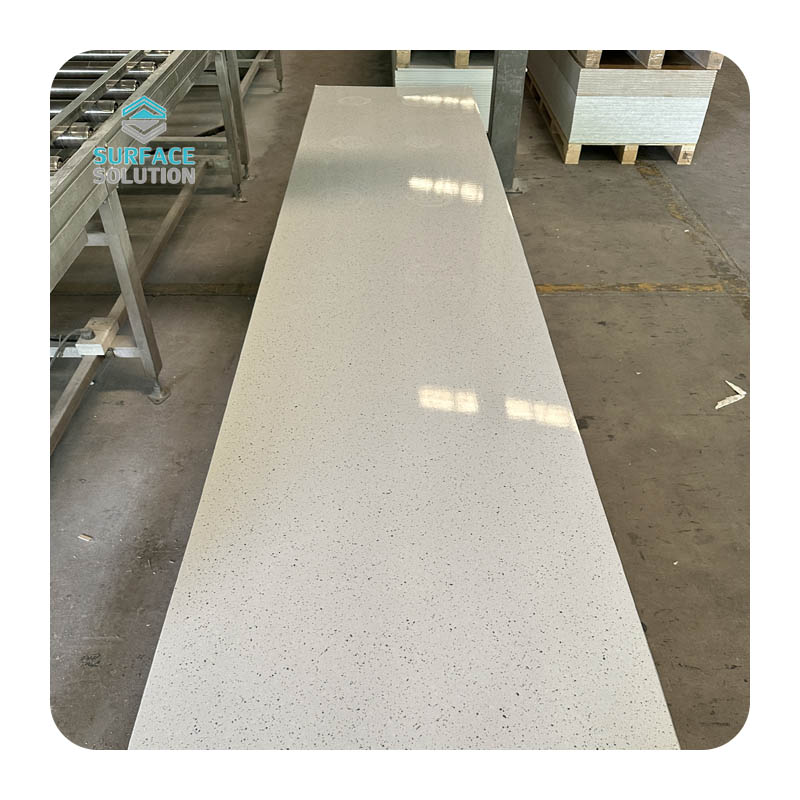
Top 10 Solid Surface Counter Designs for Modern Kitchens

Minimalist Pure White
A crisp, bright white solid surface countertop embodies modern simplicity. Its seamless finish pairs effortlessly with sleek cabinetry in neutral tones or bold accents like matte black hardware. The non-porous surface resists stains, making it ideal for busy kitchens where clean lines and functionality reign supreme.
Marble-Inspired Veining
Mimicking the elegance of natural marble, this design features soft gray or gold veining swirled through a white or cream base. Unlike real marble, it avoids etching and requires no sealing, making it a practical choice for modern kitchens seeking a touch of luxury.

Industrial Concrete Look
Solid surface countertops with a concrete-like texture bring an urban edge to modern spaces. Available in shades of charcoal, light gray, or even white, they complement stainless steel appliances and exposed brick walls, creating a raw yet refined aesthetic. The material’s durability ensures it stands up to heavy use.
Gradient Color Waves
For a bold statement, gradient designs transition from one hue to another—such as soft blue to aqua or gray to taupe. These fluid patterns add movement to minimalist kitchens, pairing well with flat-panel cabinets and minimalist backsplashes. The seamless construction enhances the illusion of a continuous color flow.
Geometric Pattern Inlays
Modern kitchens embrace geometric precision, and solid surface countertops can feature inlaid patterns like hexagons, chevrons, or stripes. Contrasting colors (e.g., black and white or navy and cream) create a striking focal point, while the material’s workability allows for sharp, clean edges that define the design.
Metallic Sheen
Subtle metallic flecks or a glossy metallic finish (in silver, bronze, or gold) add understated glamour. These countertops catch light, adding depth to modern kitchens with pendant lighting. They pair beautifully with warm wood tones or cool grays, balancing sleekness with a hint of opulence.
Wood Grain Mimicry
Solid surface countertops that replicate oak, walnut, or teak grain bring warmth to modern kitchens without the maintenance of real wood. Resistant to water and scratches, they complement both light and dark cabinetry, bridging the gap between contemporary design and natural elements.
Matte Black Monochrome
A matte black solid surface countertop exudes sophistication and pairs with nearly any color scheme. It contrasts dramatically with white backsplashes or light wood floors, while its non-reflective finish minimizes fingerprints—ideal for high-traffic kitchens. The seamless design enhances its sleek, modern appeal.
Two-Tone Contrast
Combining two complementary colors—such as a white perimeter countertop with a black island—adds visual interest. This design defines kitchen zones while maintaining a cohesive look. Solid surface’s versatility allows for seamless color transitions, ensuring the two tones blend harmoniously.
Translucent Edge Accents
For a futuristic twist, countertops feature a translucent edge (in clear or tinted acrylic) paired with an opaque base color. Backlit, the edge glows softly, adding ambient light to the kitchen. This design works well with modern LED lighting systems, highlighting the countertop as a functional art piece.
Each of these designs leverages the adaptability of solid surface material—its durability, seamless construction, and customizable aesthetics—to elevate modern kitchens, proving functionality and style can coexist seamlessly.
Previous: What Is A Solid Surface Countertop
Catalogue
Related Blogs
-
 A Complete Guide to Solid Surface CountertopsSolid surface countertops are an increasingly popular choice for kitchens and bathrooms alike, thanks to their durability, versatility, and seamless aesthetic. This article dives deep into everything you need to know about solid surface countertops, inclu
A Complete Guide to Solid Surface CountertopsSolid surface countertops are an increasingly popular choice for kitchens and bathrooms alike, thanks to their durability, versatility, and seamless aesthetic. This article dives deep into everything you need to know about solid surface countertops, inclu -
 The bathroom, a space blending functionality and relaxation, demands materials that can withstand moisture, daily use, and aesthetic expectations. Solid surface stone—encompassing natural stones (like marble, granite, and limestone), engineered stone (such as quartz composites), and acrylic solid su
The bathroom, a space blending functionality and relaxation, demands materials that can withstand moisture, daily use, and aesthetic expectations. Solid surface stone—encompassing natural stones (like marble, granite, and limestone), engineered stone (such as quartz composites), and acrylic solid su

















